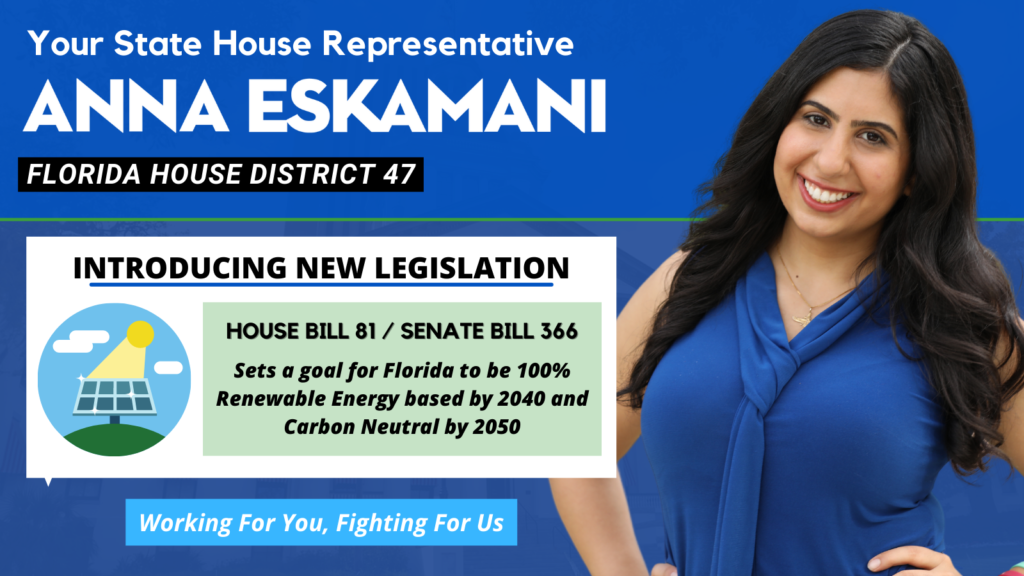The Bill to Transition Florida to 100% Renewable Energy Is Critical to Florida’s Environmental Health and Economic Success
Orlando, FL – State Representative Anna V. Eskamani (D-Orlando) and Senator Lori Berman (D-Boynton Beach) have re-filed critical legislation to transition Florida to 100 percent renewable energy by 2040 and carbon neutrality by 2050. House Bill 81 / Senate Bill 366 also bans fracking in Florida and establishes a workforce advisory committee to ensure that Florida’s drive towards a clean energy economy produces new high paying jobs; a much needed initiative following the damaging impact of COVID19 on the state’s employment rate.
“Floridians are already feeling the effects of a warmer world and are in desperate need of new high paying jobs,” said Representative Eskamani. “Our state has a lot to lose if climate change goes unchecked and a lot to gain in championing renewable energy and energy efficiency. Clean air, clean water, and new high-paying jobs are in Florida’s future if we pass this bill.”
Growing awareness of the environmental impacts of our energy use, coupled with rapid advances in technology and declining costs, have made renewable energy the “go-to” option for many communities and businesses. Now over 10 local governments in Florida have committed to 100 percent clean, renewable energy, including Orlando, St. Petersburg, Sarasota, Dunedin, Largo, Gainesville, South Miami, Satellite Beach, Tallahassee, and Safety Harbor. The State of Florida sent the wrong message last session with the passage of HB 919, which preempts local governments from restricting or prohibiting natural gas consumption for utilities even though it is non-renewable and contributes to climate change.
“As the Sunshine State, Florida should be a nationwide leader in the push for 100 percent clean, renewable energy,” added Senator Lori Berman. “Inaction by the legislature fails Floridians, hurts our health, our economy and our precious ecosystems. As ground zero when it comes to sea level rise we also need to take responsibility for tackling not just the effects but our contribution to the causes of climate change.”
As emphasized in the bill, this is not just an environmental issue– it’s an economic one too.
During the Great Recession, Congress made investments in clean energy that helped to create hundreds of new American businesses and nearly one million jobs. Before the coronavirus took down the economy, clean energy was one of the nation’s strongest sectors, growing 70 percent faster than the economy as a whole. Today Congress is debating a major infrastructure bill that includes big changes in energy, transportation and disaster preparation. This would amount to the most significant climate action ever taken by the United States and Florida is well positioned to do the same.
House Bill 81 / Senate Bill 366 would create a partnership between the Department of Energy and Department of Economic Opportunity to build a workforce board centered on championing clean energy jobs and employment trainings. But the possible opportunity cannot be overshadowed by the economic crisis that will be caused by climate change, particularly in our state, if we continue to do nothing. For example, FEMA’s national flood insurance was raised on primary residence as much as 18% in October 2021 while the state has already “lost about $5.4 billion in home value from 2005 to 2017” due to sea-level rise, and between 2018 and 2020 “home prices in exposed areas in Florida dropped by another 5% to 10%”. These problems are here and instead of disabling our local governments to respond we need to be contributing as a state towards a solution.
“Lifting up resilient job-creating industries that show the most potential for positive impact and rapid growth should be one of our biggest priorities,” said Senator Berman. “And that is exactly why we should be leading with investments in clean energy and working across government agencies to bolster clean energy jobs.”
House Bill 81 and its Senate companion are both part of a much larger movement. In fact, over one hundred U.S. cities, led by a mix of Republican and Democratic mayors, have pledged to transition their power sources to 100 percent renewable energy. In addition, 191 major companies, including Johnson & Johnson, Walmart and General Motors, have pledged to power their entire operations with renewable energy.
An environmental justice organization must be included on the workforce board too. Representative Eskamani stressed, “In the United States and around the world, vulnerable and marginalized populations like people of color, indigenous people, the elderly, children, and those with lower incomes are hit first and hardest by the climate crisis. We must make sure all communities are a part of a clean energy economy and benefit from it too.”
###

